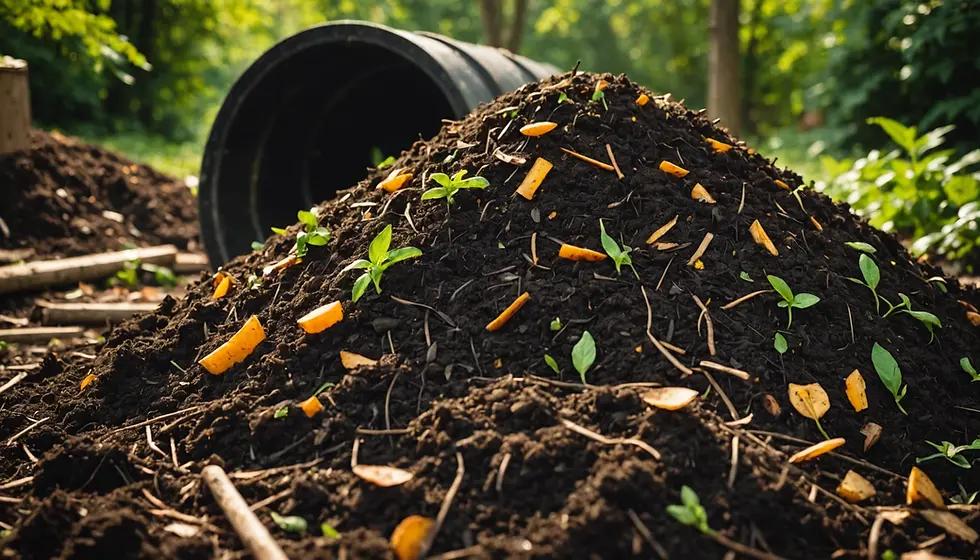Start Saving Today! Sustainable Gardening Tips That Can Help You Save Money
- gpgardendesign
- Dec 9, 2024
- 4 min read
Updated: Dec 15, 2024
As households increasingly embrace sustainable practices, it’s important to explore what you already have in your garden. With a bit of creativity, you can uncover valuable resources that help achieve your sustainability goals while keeping costs low. Let’s explore these exciting possibilities!

Discover the Power of Composting
Composting is one of the simplest and most effective ways to make your garden more sustainable while saving you from spending money on expensive manures and fertilisers. By converting kitchen scraps and garden waste into nutrient-rich compost, you can reduce landfill waste while enriching your soil.
Start by selecting a compost bin or designating a corner of your garden. Add vegetable peels, fruit scraps, coffee grounds, and dried leaves. Regularly mix the pile to promote aeration and accelerate decomposition.
Once your compost is ready, you’ll have an organic fertiliser that nurtures plant growth. Studies have shown that compost can increase crop yields by 10 to 30% compared to untreated soil, saving you money on fertilisers and supporting a healthier garden ecosystem.
Revive Old Garden Tools
Before discarding old or rusty garden tools, consider giving them a second life and simple repairs can make them feel like new again. For example, you can sharpen dull blades with a hand file and steel wool, tighten any loose screws or nuts to improve the cutting edge, and apply WD40 for lubrication. A well-maintained tool will enable you to make cleaner cuts, reducing the risk of plant diseases and promoting healthier growth, making pruning more effective and enjoyable.
Encourage Biodiversity with Hybernaculums and Log Piles
One of the many joys of gardening is seeing nature up close. You can encourage wildlife by creating habitats like hibernaculums and log piles from fallen branches and sticks. These simple structures can be built in gardens of any size and will attract birds and mammals into your space, helping to foster a more biodiverse environment.
Embrace Plant Cuttings and Divisions
Expand your garden without spending a penny by propagating plants through cuttings and divisions. Many garden plants, such as pothos and daylilies, are easy to propagate. For stem cuttings, place them in water until roots emerge—usually within one to two weeks. Once rooted, simply transplant them into your garden or pots. Dividing large perennials every few years can revitalise growth and provide new plants to share with friends and family.
This practice reduces gardening costs and enhances biodiversity, helping to attract beneficial insects and improve pollination.
Taking this a step further, harvesting seeds from vegetables, flowers and herbs can increase your long-term yield and reduce the need to buy new plants each season.
Harness the Power of Rainwater Harvesting
Rainwater harvesting is a cost-effective and eco-friendly way to conserve water. Collecting rainwater can significantly reduce your water bills and provide plants with soft, untreated water they thrive on.
To get started, place barrels under downspouts to capture rainwater runoff. Adding a fine mesh cover will keep debris and insects out. With a simple setup, you can use this natural resource to water your vegetable garden, flower beds, and landscape.
Rainwater is typically free of the chemicals found in municipal water supplies, making it a healthier option for plants and a more sustainable choice for your garden.
Create a DIY Pest Management System
Managing pests can be costly and frustrating, but you can create an effective pest management system using common household items. For example, mix dish soap and water in a spray bottle to deter pests like aphids and spider mites. Alternatively, attract beneficial insects, such as ladybugs, to naturally reduce pest populations.
These methods promote an organic approach to pest control, helping to protect both your plants and the environment while reducing reliance on chemical pesticides.
Repurpose Garden Byproducts
Your garden likely produces more byproducts than you realise, many of which can be repurposed effectively. For example, rather than discarding leaves and brush, shred them to create mulch. Mulch helps control weeds and retains moisture in your garden. You can also use natural materials from your garden to make artwork, such as sculptures or decorative borders.
By rethinking waste as an opportunity, you can stretch your garden resources further and minimise landfill waste.
Utilise and Repurpose Waste Materials
Garden features like raised beds, border edging, trellises, and screening can easily be made from waste materials such as timber pallets, fence panels, and cladding. You can also repurpose materials like glass bottles, stones, old bricks, and tree logs to create a unique garden edging. For trellises, try using string, wire, or fishing lines, or repurpose thin strips of wood to create a stylish frame.

Improve Soil with Natural Amendments
Enhance your garden's health without relying on commercial soil amendments. Using natural materials like coffee grounds, eggshells, and wood ashes can provide vital nutrients to your plants.
Coffee grounds improve soil structure and acidity, benefiting plants like tomatoes. Crushed eggshells add calcium, which helps prevent blossom-end rot in tomatoes, while wood ashes introduce potash, boosting flower and fruit production.
Incorporating these natural resources saves money and promotes healthier plants with a lower environmental impact.
A Sustainable Gardening Journey Awaits
By reusing and repurposing what you already have in your garden, you can embark on a sustainable gardening journey that saves money and supports environmental health. Whether you’re composting, reviving old tools, or creating DIY pest control, there are countless opportunities to enhance your garden’s sustainability.
Let your creativity guide you in utilising the resources at your disposal to create a beautiful, eco-friendly garden. Each small change not only improves your garden's health but also contributes to a more sustainable future.
So, take action today—uncover those hidden treasures in your garden and watch them transform into sustainable delights!
_edited.png)






Comments